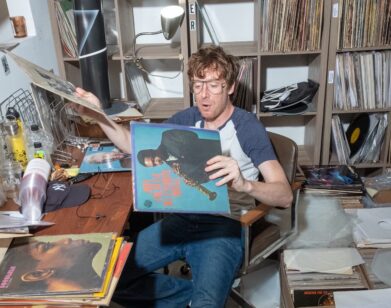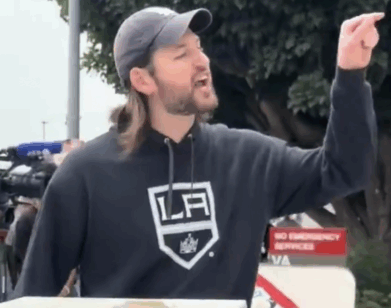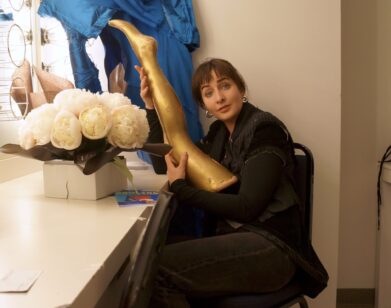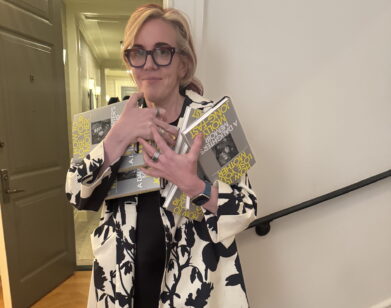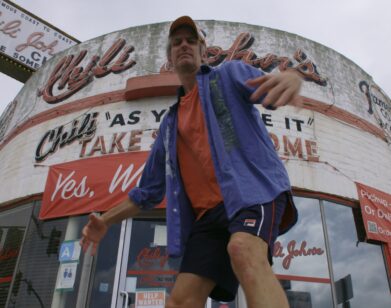Andrew Lincoln Keeps His Head
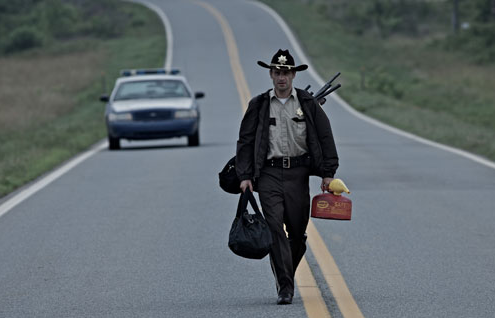
ANDREW LINCOLN AS RICK GRIMES IN THE WALKING DEAD. PHOTO COURTESY OF AMC
In the weeks following its Halloween premiere, ratings for The Walking Dead have continued to smash cable records for AMC. The heavy-petting Madison Avenue drones of Mad Men and the Southwest meth casualties of Breaking Bad are now joined at the network by a third, older type of undead, one no less papule-baiting. Over the series’ debut season, hordes of infected zombies have dragged rotting limbs across the streets and sleepy outskirts of Atlanta, and most likely the world at large, as Dead follows a generously diverse cast of survivors.
Based on the epic comic books by Robert Kirkman and overseen by filmmaker Frank Darabont (The Shawshank Redemption), the season’s six-episode arc has left as little macabre fallout to the imagination as certain job security for its ensemble of actors. Part of the show’s unique appeal lies in the fleshing-out—so to speak—of the characters, observing them warm up and cool to one another, only to recoil as their flesh is chomped on, or spared, by a Grand Guignol Darwinism. (According to Nikki Finke, even the show’s writing staff isn’t immune to sudden doom!) Appeal is also found in the setting, which, unlike Lost‘s, is realistic and potentially boundless, making for nomadic, weary characters that share a black-skied transience with the twentysomething freelancer generation.
Remaining faithful to the comics, a sturdy, small-town cop named Rick Grimes is the main protagonist. Actor Andrew Lincoln (Love Actually) plays Grimes with a patient, masculine conviction, a rare modern good guy in a cable landscape tilted with antiheroes and bungling assholes. It’s no surprise that quibbles have arisen from some fans of Don Draper, with premature charges that various Dead characters are simpletons. Will Grimes’s exhaustive hunt for bedding eventually match the dramatic depth and social commentary of Draper’s appetite for bedmates? On the eve of this Sunday’s finale, I spoke with Lincoln, his British accent baring no trace of Grimes’s Southern roots, about the strengths of the source material and all the lovely gore.
HUNTER STEPHENSON: Hi, Andrew. So, the series is quite the hit.
ANDREW LINCOLN: Thank you, Hunter. Are you enjoying it so far?
STEPHENSON: I like that it’s unafraid to be its own thing, to mix action and horror. The drama is pulpier than Mad Men.
LINCOLN: Yeah. It’s kind of earthier, isn’t it? It wears its emotions on its lapels somewhat. [LAUGHS] It’s more… out there.
STEPHENSON: With the finale near, what do you feel have been the flaws of Rick Grimes as a leader in the first season?
LINCOLN: Let’s see. When Rick makes his mind up, he’s not as flexible as he could be. This gets him into trouble, particularly this season, when he goes back to Atlanta. I think one of Rick’s great qualities, though, is that he’s so decisive and pragmatic, qualities people search out and admire in leaders. I also think Rick’s inflexibility is both a part of his character and a reaction to what’s happening around him. This situation [with the undead] has brought qualities out in people that are both good and horrible. And certainly, as I was playing him, I felt Rick [consistently] needed to have a mission, otherwise he was just stagnating. You see this in several characters. They have to keep moving. Without a horizon, they flounder. And it was a big call for Rick to go to the CDC (Center for Disease Control) in the fifth episode, but he was looking long-term. I find that admirable, because he’s looking to the future for his family, for a cure, and for sanctity.
STEPHENSON: Do you consider Rick a man out of his time? The series, arguably more than the comics, plays with imagery from iconic Westerns when he’s on screen. Is Rick Grimes developing into a folk hero in this world? And do you find he transitions well in a world without a reliance on technology?
LINCOLN: I don’t think he’s conscious of what he represents yet. When I was thinking about the role, the films The Outlaw Jesse Wales and High Noon were references that I used. And the series does have the feel of a modern Western, because there is no technology. It feels like you’re going back to the Stone Age, doesn’t it? Everything is so broken-down. And just as importantly, everything is now public. The emotions are very public, the difficult decision-making is in public. It’s very much like the Founding Fathers, where society is beginning again. And absolutely, I think the Western imagery was intentional. But Rick is not the kind of guy who would think of himself as a hero. He’s not that vain. He’s a sincere man. He doesn’t want to be Clint Eastwood. He doesn’t take the step forward to become the leader of these people. I think these people take a step back and he’s left being the guy in charge.
STEPHENSON: What happens to art in the dystopia inhabited by these characters? Will there ever be a need again for actors? [LAUGHS]
LINCOLN: What do you mean? Do you think we’re going to bump into a band of troubadours? [LAUGHS] One of the great things that attracted me to the graphic novel was that after a time, the human beings who are left adapt to the situation. The zombies become incidental. They become a day-to-day obstruction rather than a threat, because they are managed. It’s evolution, isn’t it? The human beings start to evolve. When they begin to manage the world, only at that point perhaps, when they have social structure, will secondary human necessities like art and entertainment come into play. Funny enough, I think the moments that are currently equivalent to that involve [the character] Dale, who tells stories with memory. That’s how drama began, isn’t it? With people around the fire telling stories. And Dale, as the older member, like an ancient member of the tribe, he carries forth the stories and nostalgia of the past. This world offers great opportunities to rediscover this. What do these characters choose to bring into this new and brutal world to sustain themselves emotionally and cerebrally?
STEPHENSON: In the series, the living often refer to the zombies as “geeks.” Before their world was turned upside down, did zombies exist in their pop culture? Is Rick Grimes familiar with how zombies have been depicted in movies? For instance, has Rick seen a George Romero zombie movie?
LINCOLN: Interesting. Well, I think this decision—I don’t want to speak for [comics creator] Robert Kirkman—but it adds gravitas to the characters’ situation. Even if the characters had zombies as reference points like we do, the word “zombies,” I feel it doesn’t do justice to the horror of what they represent. I think you’re probably right. I like to imagine these people as having the same reference points as us. But, you know, the cast, we like to discuss when the show is happening: is this situation happening now or 10 years ago? We take it as now. It’s one of those questions that we have discussed. But the word “zombie” has a campy connotation and we were all very, very concerned with making a serious drama. So, maybe the decision is a remnant, a residue, of that. Let’s nudge away the word “zombie” and keep “walker,” which is what the characters also call them. I think “walker” is powerful, because it has a human connotation. It brings you closer to the human aspect of these monsters. It’s a human with the soul ripped out. It’s the nihilistic vision of hell, isn’t it? That we’re all driven only by base instincts. It’s not even a carnal drive. It’s cannibalism. This is like the Plague, the Black Death, but instead of having a fever and dying from it, you turn into a walker.
STEPHENSON: And the transformations and special effects are one of the highlights. Judging by your interaction with gore, you’ve dealt quite a bit with [the series’ horror effects guru] Greg Nicotero. Do you have a good story from the set?
LINCOLN: He’s a great friend. I love Greg to bits. There was a time when I was chopping up a corpse on set. It was 4:30 in the morning, and I looked at Greg. Now, this is a man who is not unaccustomed to gore. I looked at him and said, “Straight to DVD?” and he nodded. But, you know, that entire scene was kept. It aired on AMC. It blew my mind! But for true fans of the show, they should know that Greg plays two of the main zombies. This a secret, but I’m going to disclose it to you. We beat him! There is a scene in the third episode where a zombie is shown eating a deer.
STEPHENSON: Yes. It’s hard to forget.
LINCOLN: That zombie is Greg. And we beat him! And bless him, Jon Bernthal, who plays Shane, was pummeling him with his gun but the padding came off on the fourth take. And poor old Greg, beneath all that latex, we could hear him wheezing as he’s being battered to bits. That’s his level of commitment. And the scene where Amy, played by Emma Bell, when she’s bitten in the arm by a zombie. Greg did the bite molds and the latex in those scenes so beautifully, so he played the zombie there as well. He’s incredibly hands-on. That is why he truly is the Willy Wonka of gore.
THE SEASON FINALE OF THE WALKING DEAD, “TS-19,” AIRS THIS SUNDAY ON AMC AT 10 P.M. EST, PRECEDED BY A SEASON MARATHON AT 4:30 P.M.

